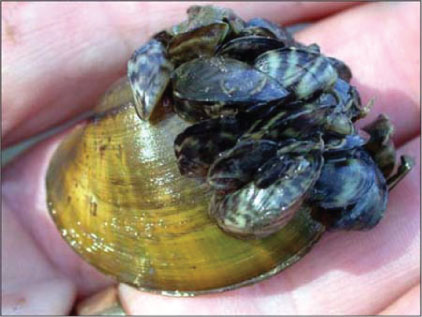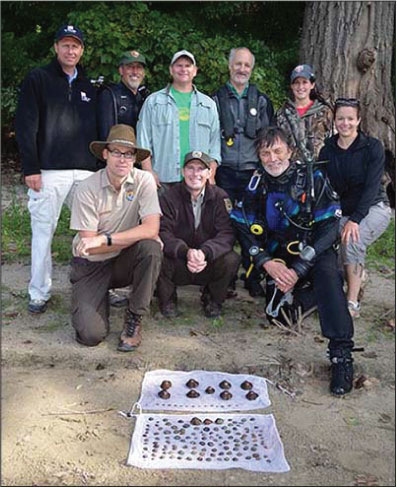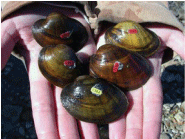MUSSEL MATTERS
What is being done to prevent extenction?
Propagation Project
Higgins' eye populations are in immediate danger of being eliminated in the Upper Mississippi River. If that occurs, the only remaining Higgins' eyes will be found in small populations in the St. Croix and Wisconsin Rivers. One of the strategies to save the species is the propagation of the Higgins' eye at Genoa National Fish Hatchery. The project is a partnership effort among the Service and the states of Minnesota and Wisconsin.
The propagation process for Higgins' eye begins in the spring with the collection of adult females from the St. Croix River. Divers trained to identify female Higgins' eye pearlymussels collect about 15 gravid females, or those that contain glochidia within them. The adult mussels are taken to Genoa National Fish Hatchery, where hatchery workers carefully remove the glochidia using a syringe.
After 2 or 3 weeks, some of the infected fish are taken to sites in suitable habitat where they are either released directly into the river, or held in underwater cages over suitable mussel habitat. Fish remaining in the hatchery are checked periodically, and hatchery staff collect glochidia once they have matured enough to leave the host fish. These juvenile mussels remain at the hatchery until mid-summer when many are released into areas where zebra mussels are not a threat.
Preventing the spread of Zebra Mussels



The increase in zebra mussel populations has been matched by a decline among many native mussels. Zebra mussels compete with native species for oxygen and food, and are so prolific that they can virtually smother native mussel beds.
One contributing factor to the spread of zebra mussels in the Upper Mississippi River is the operation of the navigation system of locks and dams on the river to facilitate barge traffic and other river users. In an Endangered Species Act consultation with the Corps of Engineers on the navigation system, the Service determined that operation of the system would jeopardize the existence of the Higgins' eye pearlymussel. As a result of that consultation, the Service and Corps agreed to measures that would lessen the impacts on the Higgins' eye. Measures included relocation and propagation of mussels threatened by the presence of zebra mussels.